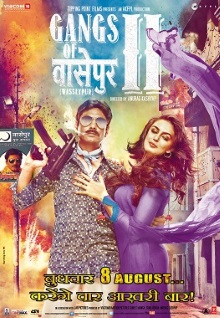
This second part follows directly from the first one and as they were shot together should be seen as a single epic. Nonetheless there are discernible differences. Unlike the first one, this one takes place across a much shorter span of time as we approach the present. With the level of violence escalating drastically in this one, it also starts to feel more like a conventional action movie.
Sardar Khan is assassinated by Sultan of the Qureshis, who is angry about his sister marrying Danish, Sardar’s eldest son. The plot is of course orchestrated by the Khans old enemy Ramadhir Singh. Danish kills a number of Sultan’s underlings in response but is himself killed soon afterwards. Therefore it falls to the second son Faizal to become head of the family. He is at first derided as being lazy and useless due to his drug addiction but cements his reputation by beheading his own friend Fazlu who had provided information to Sultan. Meanwhile Sardar’s other sons are also growing up. Definite, the son of Sardar’s Bengali second wife, begins making a name for himself as his mother continually eggs him to not allow Faizal to take everything. Even scarier is Perpendicular, the 14-year old youngest son from his first wife. He terrorizers the local shopkeepers, taking whatever he wants at will knowing that no one dares to lift a hand against him due to his being the youngest brother of Faizal. The shopkeepers have no choice other than to secretly conspire with Sultan to kill the young boy.
I complained in the previous post about how odd it is that despite all of his enemies knowing exactly where the Khan family lives they’re left alone most of the time. This ends here as each iteration of revenge kicks up the level of violence and this time even women and children are not spared. There are some powerful moments here such as when Sultan comes across his own sister and Perpendicular’s story of a petty thug makes for a poignant reminder that the age of the mythologized bandit king or classy don is well and truly over. I also liked Ramadhir’s claim that he has survived three generations of Khans because unlike everyone else, he doesn’t romanticize himself as the hero of a Bollywood gangster film and thus values practicality above all. As the level of violence escalates so does the quality of the weapons, eventually leading to shootouts with assault rifles.
Unfortunately while there are some humanizing moments, such as Definite’s fumbling about when carrying out hits, the film still veers towards glamorizing violence. In real life many of the assassinations were carried out using less dramatic means, such as poison, but this film loves showing shootouts. This film also has the same flaw as the previous one in that it glosses over the activities that the Khans do to make money. Iqlakh’s plan for Sardar to fix the auctions for scrapped train parts sounds like a carefully researched detail but it isn’t given much weight in the narrative. Instead we have things like Sardar sneaking around his house during an attack in an extended scene that turns out to not matter at all. Also odd is that it paints Sardar as being easily seduced by money, yet he is never shown actually spending much of it. His lifestyle is pretty much the same as always and the family never travels out of Wasseypur. It seems as though the point is just to be the local boss as a point of pride rather than to enjoy the spoils.
It makes for a fitting enough capstone for this epic tale, being perhaps more entertaining than the first part but less interesting due to it being more of a generic gangster film. I find it educational as we tend to see plenty of Hollywood gangster stories and we’ve already been exposed to lots of Hong Kong gangsters in the past. No doubt India makes many films in this genre as well even if we don’t pay any attention to them so it’s good to watch a particularly good and realistic exemplar of it to broaden the mind.